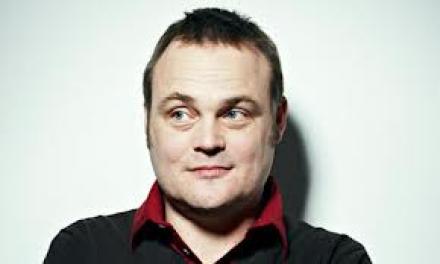
Is it possible to learn to be a comedian? A lot of people obviously think so. Well over a hundred were prepared to pay between £99 and £150 for a one-day intensive and very enjoyable crash course in the subject on Saturday. The Big Comedy Conference, run by The British Comedy Guide and co-ordinated by comedian Dave Cohen, took place in Clerkenwell in London and offered budding comedy people the chance to find out more about all aspects of the subject from business to TV to performance from the people who know.
Among those taking part in numerous talks, workshops and seminars were commissioning editors, producers, Jo Brand, Gary Delaney, Reggie Perrin creator David Nobbs and Dave Schneider. Unfortunately I was unable to see a number of interesting talks because they clashed with others I was taking part in myself. At the start of the day I was on the panel of So You Wanna Be A Stand Up? alongside pun maestro Tony Cowards and seasoned booker Geoff Whiting. Sara Pascoe chaired and we tried to give a room full of comedians starting out some tips. The main one seemed to be do lots of gigs. And then do some more. Comedy demands total commitment and playing in front of live audiences is the only way to improve.
Geoff talked emphatically of acts that had turned down gigs he had offered them because the travel was too much and pointed to Jimmy Carr who, in his early days, was prepared to go from London to Chesterfield and back to do an unpaid 20-minute spot to show Geoff that he could cut it. That is the kind of dedication comedy takes. There was an interesting discussion about comedy courses being a mixed blessing. The best ones - such as the ones run by Logan Murray and, erm, Geoff Whiting - are worth attending, but there is a risk of turning novices into indentikit comedians. The secret apart from lots of gigging and learning how to get the mic out of the stand, is finding your voice. Which, erm, you can probably only do by lots of gigging.
At the end of the day I took part in a session on whether new comedians should go to Edinburgh. The talk was chaired by Arthur Smith and the other panellists were 99 Club boss James Woroniecki and Downstairs at the King's Head head honcho Peter Grahame. There were mixed feelings about Edinburgh among the panellists and also mixed feelings in the audience. The fear is that Edinburgh may cost a fortune. But, I pointed out, it doesn't have to. One aspiring stand-up said he was considering checking out the Edinburgh Fringe on a holiday. I suggested that he should try to bag some open spots on the ever-expanding Free Fringe while he is there. His basic expenses - travel, food, accommodation- would be the same whether he gigged or not. I certainly think if you are starting out you should go to Edinburgh, but as we all agreed, don't, for God's sake, do an hour until you are really ready. That is the guaranteed way to madness, depression and a stinking big overdraft.
The main session I attended was Al Murray being interviewed by script editor Andrew Ellard. The room was packed for this. I suspect more people at the conference were interested in TV writing than stand-up as The British Comedy Guide originally started out as The British Sitcom Guide before expanding its brief into live comedy.
Murray was, of course, very good value for money, shedding a lot of light on the ups and downs of his own career onstage and on television. He follows the advice of David Mamet, and puts action before character, and also quoted GK Chesterton, who said that the frame is more important than the picture. He also talked about his relief that an American TV pilot featuring the Pub Landlord, entitled Union Jackass, did not take off. The experience of working in a writer's room with Americans was fascinating though, he added. They had a different writer for each different aspect of the programme from the plot to the one-liners and while they were all brilliant the thing just didn't work. When it was shown to focus groups half said they loved it but half couldn't understand the Landlord's anger and asked "why is he raging against America?".
So was the conference worth it? The people frantically scribbling notes and networking furiously certainly thought so. TV bosses and comedy club promoters had better brace themselves for a lot more scripts and a lot more enquiries about open spots in the near future.



